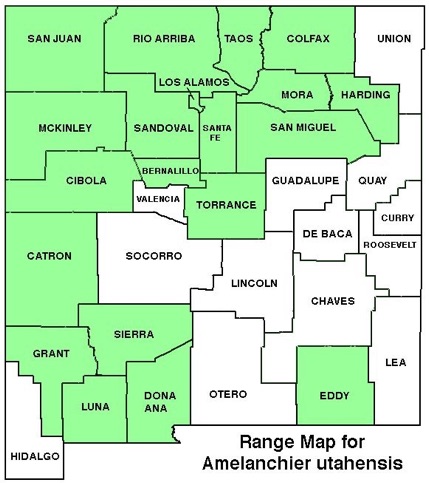WILDFLOWERS OF NEW MEXICO

This upright, bushy shrub to small tree 3–16 feet tall (1–5 m) greets spring with clusters of snow-white flowers as the leaves begin to emerge. Note the numerous, branching stems, strongly-veined alternate leaves with coarse teeth, and blackish berries; thicket forming.
FLOWERS: April–June; fruit July–September. Short, elongated clusters erect to drooping, on branch tips with 3–6 flowers; 5 narrow, spoon-shaped, white petals, 1/4–3/4 inch long (6–9 mm); 10–15 stamens. Fruit a fleshy, juicy pome 1/4–3/8 inch diameter (7–10 mm), red becoming dark-purplish.
LEAVES: Alternate, stalked; blades oval to oblong, 3/4–1 1/2 inches long (2–4 cm); upper half serrated, surfaces veined, bottom usually finely hairy by flowering, tip rounded.
HABITAT: Desert canyons, dry foothills, mountain slopes; pinyon juniper woodlands, ponderosa-Douglas fir, aspen forests.
ELEVATION: 6,000–10,000 feet (1828–3048 m)
RANGE: Rocky Mts. and all states westward.
SIMILAR SPECIES: Western Serviceberry, A. alninfolia, in northern mountains of NM, has clusters with 5–15 flowers, fruit 3/8–5/8 inch diameter (10–15 mm), and leaves that are hairy when young and usually hairless as flowering progresses
NM COUNTIES: Widespread, common in mid-elevation, dry habitats in NM mountains: Bernalillo, Catron, Cibola, Colfax, Dona Ana, Eddy, Grant, Harding, Los Alamos, Luna, McKinley, Mora, Rio Arriba, San Juan, San Miguel, Sandoval, Santa Fe, Sierra, Taos, Torrance.









UTAH SERVICEBERRY
AMELANCHIER UTAHENSIS
Rose Family
Deciduous shrub



























THE CONTENTS OF THIS WEBSITE ARE COPYRIGHTED AND CANNOT BE USED
WITHOUT PERMISSION OF GEORGE OXFORD MILLER
















EMAIL ME




































Fruit turns black when nature.
Leaves maintain a hairy bottom as flowering progresses.
SIMILAR SPECIES
Western Serviceberry, A. alninfolia, in northern NM mountains, has slightly larger leaves, more flowers per cluster, and leaf bottoms that become hairless as flowering progresses.

















